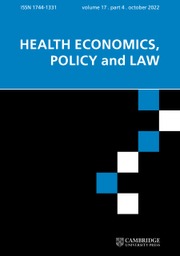Article contents
A tribute to the foot soldiers: European health agencies in the fight against antimicrobial resistance
Published online by Cambridge University Press: 30 July 2020
Abstract
The prevention of antimicrobial resistance (AMR) has been a flagship of the EU's health policy since the early 2000s, leading the European Commission to mandate three European agencies to cooperate in the fight against AMR: EMA (the European Medicines Agency), ECDC (European Centre for Disease Prevention and Control) and EFSA (the European Food Safety Agency). This article is at the intersection of EU health policy and the burgeoning scholarship on bureaucratic reputation. Little is known on the role played by reputational incentives on inter-agency cooperation. This empirical work supports the claim that cooperation creates incentives for agencies to protect their reputational uniqueness vis-à-vis each other. However, rather than threatening their cooperation, it amounts to a process of sense-making of their respective roles in the integrated fight against AMR. Evidence is generated through the agencies' textual sources, as well as in-depth interviews and analysed through a narrative analysis. From the early days of inter-agency cooperation, to recent legislative work, this paper offers in-depth insights on the EU's governance against AMR.
- Type
- Article
- Information
- Health Economics, Policy and Law , Volume 16 , Special Issue 1: SPECIAL ISSUE: The future of EU health law and policy , January 2021 , pp. 23 - 37
- Copyright
- Copyright © The Author(s), 2020. Published by Cambridge University Press
References
- 5
- Cited by



